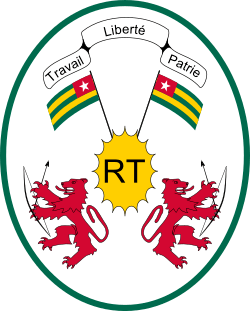Education in Togo
Education in Togo is compulsory for six years.[1] In 1996, the gross primary enrollment rate was 119.6 percent, and the net primary enrollment rate was 81.3 percent.[1] Primary school attendance rates were unavailable for Togo as of 2001.[1] (While enrollment rates indicate a level of commitment to education, they do not always reflect children’s participation in school.[1])
The education system has had teacher shortages, lower education quality in rural areas, and high repetition and dropout rates.[1] In the north part of the country, 41 percent of the primary school teachers are remunerated by the parents compared with only 17 percent in Lome, where incomes are substantially higher.[1] Despite the increase in number of school kids, education in Togo is insufficient.
The number of adults that go to school is very low. The mean of adult learning from 2003 to 2013 was estimated to be only 3% of the adult population.[2] Nevertheless, there are attempts to improve the quality of education in Togo. A plan for free education has been put into action; tuition for primary schools has been forbidden. Many children go to school and it is becoming easier for poor parents to send their children to school, but there is a long way to go.[3]
References
- 1 2 3 4 5 6 "Togo" Archived 2008-02-02 at the Wayback Machine.. 2001 Findings on the Worst Forms of Child Labor. Bureau of International Labor Affairs, U.S. Department of Labor (2002). This article incorporates text from this source, which is in the public domain.
- ↑ Togo Education Stats, NationMaster. 13 March 2013.
- ↑ UNICEF supports quality education in Togo, Unicef.org. Unicef West and Central Africa. 11 September 2009. 19 March 2013.
